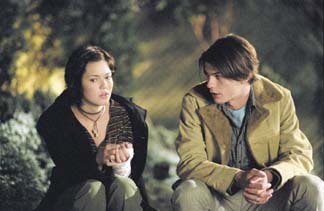Deal With It
Teenie bop drama
By Daniel Kraus

Man, you can just feel the angst.
That creepy silence you just heard was America's film critics stunned speechless by the new Mandy Moore vehicle How to Deal. Yeah, I know what you're thinking. It stars Mandy Moore. It's about "first love." It's called How to Deal, for crying out loud. It HAS to be terrible. The universe would make no sense if it WASN'T terrible-dogs would be marrying cats. Mandy Moore would be a well-respected thespian.
Brace yourselves: How to Deal is really, really, reallynot terrible.
That's not to say it's great. In fact, if you happen to be over 21 (you poor thing), I'd recommend skipping it. But How to Deal is still so shockingly much better than it should be.
Did I mention it stars Mandy Moore? That's like saying it stars Pauly Shore or Carrot Top. Until now, Moore was the rough equivalent of Freddie Prinze, Jr. and her position in the entertainment sphere seemed depressingly predestined-she was going to spend the next 10 years making totally insufferable crap with vague, teeny-bopper titles like, well, How to Deal.
But you'd never suspect that the title refers not to petty "who's going to ask me to the prom" stress-outs, but actual five-alarm whoppers-sickness, death, pregnancy, and other calamitous facts of life. Moore plays Halley Martin, a high-schooler who cynically observes life sprawling messily about her. Her parents are divorced; her dad (Peter Gallagher) is an embarrassing radio DJ, and her mom (Allison Janney) is viciously bitter. Her sister Ashley is getting married and her best friend Scarlett has just fallen in love. Ignoring the multiple (but apparently pointless) Gone With The Wind references, it sounds like pretty standard teen stuff, especially when Halley meets Macon (Trent Ford), the Kid From the Wrong Side of the Tracks, and falls for him despite her better judgment. Worse, there's a whiny, badly-written voice-over where Halley gets to make such dim observations as "Sometimes life is so perfect," and "Why does love make people crazy?"
And of course there's the redundant pop soundtrack.
But you know something is different after the requisite Falling-in-Love Montage.
You're familiar with this scene: Halley and Macon go to movies, eat ice cream and wear funny hats, and it's all set to a bubbly pop song (in this case, Liz Phair's "Why Can't I"). The scene hits every cliché in the book. Come on-popcorn? Ice cream? Sure, the scene sucked, but the film had earned it-instead of "lazy," the scene merely felt "efficient."
Tucked neatly between the vacuum-packed moments fresh from the Teen Movie Assembly Line are the wonderful details that turn How to Deal into something almost relevant. The awkward make-out sessions are wholly authentic. So is the party Halley attends; it is like every party you went to in high school-loud, stupid, and held in somebody's musty basement. You can almost smell the stale beer.
There are also moments of weird poetry. A rock song is played from a cassette player at a funeral and instead of being just corny, it feels heart-breakingly corny-a big difference. A moment later, caught in the rain, the mourners cover their heads with dozens of programs all bearing the face of the deceased. There's something else going on in these scenes and although let's hesitate to use the word "subtext," there's no doubt that the material is being deftly handled by director Clare Kilner.
In fact, Kilner comes off like John Hughes during one of his better "serious" films. Swap Moore and Ford for Molly Ringwald and Judd Nelson and you've got a teen film that cares enough to keep matters somewhat realistic and refreshingly loose. Despite an ending that's a tad too tidy, How to Deal is gloriously random. Bad things happen. Good things happen. People break up. People get back together. It's like a film an adolescent Ed Burns (Brothers McMullen) might make, only better.
Heavy teen drama is almost impossible to pull off, and at times How to Deal feels like an episode of the "Wheel o' Trauma." But there's a payoff. Near the end, a character says, "I hate you" while meaning the exact opposite. This would have been tiresomely explained in a lesser film. But in How to Deal, you know exactly what the character means, without adding a single unnecessary word.
HOME | THIS ISSUE | ACE ARCHIVES